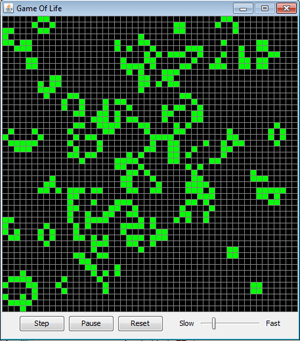 |
TigerJython | xx für Gymnasien |
Spielfenster
Actors
Figuren bewegen
Animierte Actors
Kollisionen im Gitter
Tastatursteuerung
Verfolgung
Maus-Events I
Maus-Events II
Pixel-Kollisionen
LightsOut Game
Labyrinth
Memory Game
Snake Game
Mastermind
Reversi Game
Four in a Row
Solitaire
Nim Spiel
Game of life
Schwarmsimulation
Skilift Simulation
Sudoku
Aufgaben
Dokumentation
Forum
Forum
Game of life
Eine Population entwickelt sich nach folgenden Regeln: Jede Zelle hat 8 Nachbarzellen.
Implementierung:
|  |
# Game of Life from gamegrid import * class Game(GameGrid): def __init__(self): GameGrid.__init__(self, s, s, 800 // s, Color.gray) self.setTitle("Game Of Life") self.reset() self.show() def reset(self): # Called when the reset button is clicked for x in range(s): for y in range(s): a[x][y] = 0 # All cells dead for n in range(z): loc = self.getRandomEmptyLocation() a[loc.x][loc.y] = 1 self.showPopulation() def showPopulation(self): for x in range(s): for y in range(s): loc = Location(x, y) if a[x][y] == 1: self.getBg().fillCell(loc, Color.green, False) else: self.getBg().fillCell(loc, Color.black, False) def getNumberOfNeighbours(self, x, y): nb = 0 for i in range(max(0, x - 1), min(s - 1, x + 2)): for k in range(max(0, y - 1), min(s - 1, y + 2)): if not (i == x and k == y): if a[i][k] == 1: nb = nb + 1 return nb # Automatically called at the end of each simulation cycle def act(self): global a b = [[0 for x in range(s)] for y in range(s)] for x in range(s): for y in range(s): nb = self.getNumberOfNeighbours(x, y) if a[x][y] == 1: # live cell if nb < 2: b[x][y] = 0 elif nb > 3: b[x][y] = 0 else: b[x][y] = 1 else: # dead cell if nb == 3: b[x][y] = 1 else: b[x][y] = 0 a = b self.showPopulation() s = 50 # Number of cells in each direction z = 1000 # Size of population at start a = [[0 for x in range(s)] for y in range(s)] Game() |